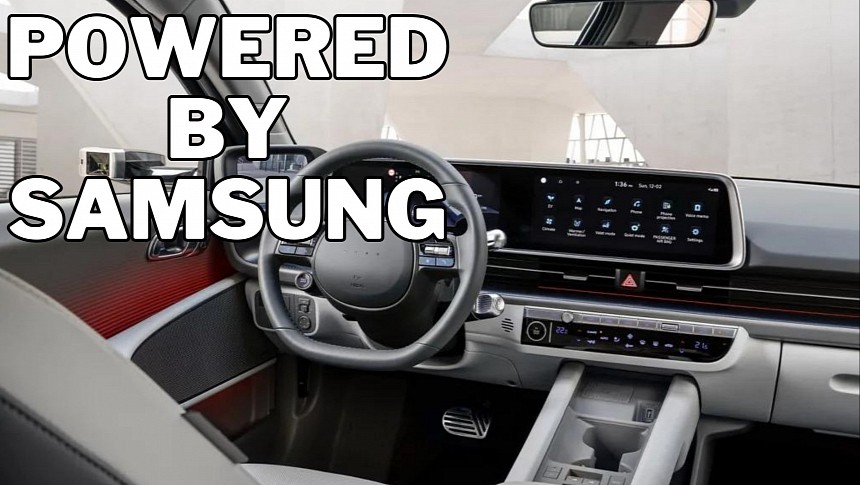The battle for infotainment systems has reached new levels, not only because everything in the car is becoming a screen but also because carmakers themselves have figured out a way to make money out of this piece of technology.
Infotainment systems are seen as huge cash cows in the long term, and as a result, car manufacturers are already investing massively in new-gen technology on this front.
Hyundai has recently partnered with Samsung to use the Exynos Auto V920 in its vehicles. The first in-vehicle infotainment system, also referred to as IVI, will debut in a Hyundai vehicle by 2025, and according to the official specs, it'll offer outstanding performance.
As I said earlier, the infotainment revolution comes down to turning everything into a screen. Samsung's new chip has been specifically optimized for this new trend, as it can power a total of six high-resolution displays, not only on the dashboard but also for the main infotainment capabilities and the rear-seat entertainment systems.
As such, the new chip will be in charge of everything that is displayed on the screen, packing 10 Arm cores to achieve 1.7 times improved performance versus its predecessor.
With such significant upgraded performance, it's not hard to figure out where this is going. Samsung wants not only to go after carmakers interested in overhauling their infotainment systems but also after companies betting big on autonomous driving.
Samsung's chips are substantially faster than before (partially thanks to Arm's upgrades as well), so they can help power additional equipment in the car by improving processing times. For example, this Exynos model packs a new neural processing unit that's 2.7 times faster than the previous version, allowing for additional systems, such as driver monitoring, to be conducted more efficiently.
At the same time, Exynos Auto V920 can handle a total of 12 camera sensors (in addition to the army of screens mentioned above).
Oddly enough, this is the first time Samsung has worked together with Hyundai on an infotainment chip, which is kind of expected given a South Korean company should play nice with another South Korean company. Sure enough, I expect the chip collaborations to expand in the coming years, especially as Samsung wants to be at the forefront of this transformation in the long term.
Compared to rival Apple, which is building its own car from scratch, Samsung wants to expand to the automotive industry using services and hardware. The company is investing aggressively in chips to power next-generation systems. Apple is expected to launch a self-driving EV in the second part of the decade, with most systems developed in-house. Apple will become a rival to traditional carmakers, whereas Samsung will work with any interested party as long as they want its hardware.
Hyundai has recently partnered with Samsung to use the Exynos Auto V920 in its vehicles. The first in-vehicle infotainment system, also referred to as IVI, will debut in a Hyundai vehicle by 2025, and according to the official specs, it'll offer outstanding performance.
As I said earlier, the infotainment revolution comes down to turning everything into a screen. Samsung's new chip has been specifically optimized for this new trend, as it can power a total of six high-resolution displays, not only on the dashboard but also for the main infotainment capabilities and the rear-seat entertainment systems.
As such, the new chip will be in charge of everything that is displayed on the screen, packing 10 Arm cores to achieve 1.7 times improved performance versus its predecessor.
With such significant upgraded performance, it's not hard to figure out where this is going. Samsung wants not only to go after carmakers interested in overhauling their infotainment systems but also after companies betting big on autonomous driving.
Samsung's chips are substantially faster than before (partially thanks to Arm's upgrades as well), so they can help power additional equipment in the car by improving processing times. For example, this Exynos model packs a new neural processing unit that's 2.7 times faster than the previous version, allowing for additional systems, such as driver monitoring, to be conducted more efficiently.
At the same time, Exynos Auto V920 can handle a total of 12 camera sensors (in addition to the army of screens mentioned above).
Oddly enough, this is the first time Samsung has worked together with Hyundai on an infotainment chip, which is kind of expected given a South Korean company should play nice with another South Korean company. Sure enough, I expect the chip collaborations to expand in the coming years, especially as Samsung wants to be at the forefront of this transformation in the long term.
Compared to rival Apple, which is building its own car from scratch, Samsung wants to expand to the automotive industry using services and hardware. The company is investing aggressively in chips to power next-generation systems. Apple is expected to launch a self-driving EV in the second part of the decade, with most systems developed in-house. Apple will become a rival to traditional carmakers, whereas Samsung will work with any interested party as long as they want its hardware.



















